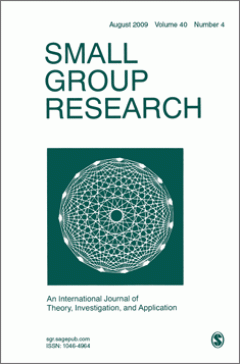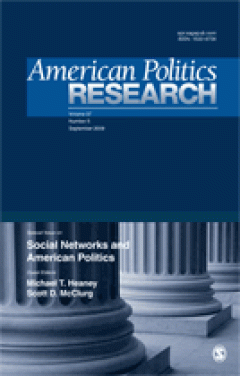Filter by

Effects of Intergroup Dialogue: Public School Teachers and Sexual Orientation…
Prejudice and hate crimes against lesbians and gay men are prevalent throughout the United States. Prejudice in public school settings is particularly problematic for lesbian, gay, and bisexual (LGB) students and LGB parents. Efforts to reduce prejudice for LGB groups have met with limited success. Creating safer and more inclusive school environments is essential. An experimental mixed methods…
- Edition
- Vol. 41 no. 5, October 2010.pp. 556-592
- ISBN/ISSN
- 10464964
- Collation
- -
- Series Title
- Small Group Research
- Call Number
- -

Age-Based Faultlines and Perceived Productive Energy: The Moderation of Trans…
This article addresses the role of age-based faultlines in relation to the perceived productive energy of work teams and transformational leadership as a potential moderator of this relationship. Based on social identity and social categorization theory, teams that have strong age-based faultlines� defined as age subgroup formation that is reinforced by internal alignment with other demographic…
- Edition
- Vol. 41 no. 5, October 2010.pp. 593-620
- ISBN/ISSN
- 10464964
- Collation
- -
- Series Title
- Small Group Research
- Call Number
- -

Understanding the Motivational Contingencies of Team Leadership
Despite increased research on team leadership, little is known about the conditions under which coaching versus directive forms of team leadership are more effective, or the processes through which team leadership styles influence team outcomes. In the present study, the authors found that coaching leadership was more effective than directive leadership when the team leader was highly charismat…
- Edition
- Vol. 41 no. 5, October 2010.pp. 621-651
- ISBN/ISSN
- 10464964
- Collation
- -
- Series Title
- Small Group Research
- Call Number
- -

District Magnitude, Social Diversity, and Indonesia's Parliamentary Party Sys…
This study analyzes the party system in Indonesia's parliamentary elections since 1999. It argues that neither district magnitude nor social diversity accounts for the dramatically increased number of parties in votes at the district level over time; the increase may stem from the introduction of popular presidential elections and the rise of new issues.
- Edition
- Vol. 50, No. 4, July/August 2010. Pages 663–683
- ISBN/ISSN
- 00044687
- Collation
- -
- Series Title
- Asian Survey
- Call Number
- -

Government Waste in China: Situation, Causes, and Countermeasures
The administrative expenditure of China has been growing rapidly in the past decades. This paper examines the forms and causes of government waste hidden in the high levels of administrative expenditure. Based on the findings, several specific policy suggestions are made.
- Edition
- Vol. 50, No. 4, July/August 2010. Pages 684–708
- ISBN/ISSN
- 00044687
- Collation
- -
- Series Title
- Asian Survey
- Call Number
- -

A Deliberative Approach to the Tibet Autonomy Issue: Promoting Mutual Trust t…
This paper reviews and compares three deliberative approaches to conflict, and applies the deliberative approach to the Tibet issue. It examines the case of a deliberative workshop, its achievements and limits. Deliberative dialogue appears to have improved knowledge and mutual understanding, enhanced mutual trust and deliberative capacities, and produced moderating effects.
- Edition
- Vol. 50, No. 4, July/August 2010. Pages 709–734
- ISBN/ISSN
- 00044687
- Collation
- -
- Series Title
- Asian Survey
- Call Number
- -

A Tale of Two Afghanistans: Comparative Governance and Insurgency in the Nort…
Afghanistan is often depicted as a failing state, but its failures display distinctive patterns over time and space. Regional variations in governance have been important in shaping the ways the Afghan state has failed and the consequences of these failures. This article argues that a history of better governance in the north facilitated the disarmament of militia warlords and comparative stabi…
- Edition
- Vol. 50, No. 4, July/August 2010, Pages 735–758
- ISBN/ISSN
- 00044687
- Collation
- -
- Series Title
- Asian Survey
- Call Number
- -

China's Rise in Antarctica?
China has begun a new phase in its Antarctic engagement. Beijing has dramatically increased Chinese scientific activities on the frozen continent and is looking to take on more of a leadership role there. This paper draws connections between China's expanded Antarctic program and debates on its foreign and domestic policies.
- Edition
- Vol. 50, No. 4, July/August 2010, Pages 759–785
- ISBN/ISSN
- 00044687
- Collation
- -
- Series Title
- Asian Survey
- Call Number
- -

Is Hong Kong Democratizing?
We argue that the transition to Chinese authority has not undermined democratic governance in Hong Kong and that voice and accountability have improved since the handover. We seek to explain this surprising result and conclude with a discussion of the implications of our findings for China, Taiwan, and cross-strait relations.
- Edition
- Vol. 50, No. 4, July/August 2010, Pages 786–807
- ISBN/ISSN
- 00044687
- Collation
- -
- Series Title
- Asian Survey
- Call Number
- -

China's Roads to Influence
This paper argues that although the People's Republic of China is promoting crossborder networks as a new regional common good, it is driven by both the fear of losing influence to other powers and the desire to create an open economic order in pursuit of Chinese interests. As in most forms of communication, it also appears in this case that the strongest player is best positioned to use these …
- Edition
- Vol. 50, No. 4, July/August 2010, Pages 641–662
- ISBN/ISSN
- 00044687
- Collation
- -
- Series Title
- Asian Survey
- Call Number
- -

The Rhetorical Possibilities of “Home” in Homeland Security
The creation of the Department of Homeland Security introduced �homeland� as a new concept into American political rhetoric. Using common language, literature, and philological analysis, this article uncovers the wide array of meanings that the metaphor home generates. These meanings can expand and constrain the policy focus of an institution dedicated to �home�-land security. They define home …
- Edition
- Vol. 42 no. 6, September 2010. pp. 479-503
- ISBN/ISSN
- 00953997
- Collation
- -
- Series Title
- Administration & Society
- Call Number
- -

Rethinking Systems: Configurations of Politics and Policy in Contemporary Gov…
New governance patterns in Western democracies pose challenges to political analysis. Key here is the relationship of politics and policy. This article examines how this relationship is changing in terms of a communication systems shift. From this perspective, the adequacy of current frameworks of political analysis is called into question. The article applies this critical review to the rise o…
- Edition
- Vol. 42 no. 5, September 2010.pp. 504-525
- ISBN/ISSN
- 00953997
- Collation
- -
- Series Title
- Administration & Society
- Call Number
- -

Communicating Identity: The Use of Core Value Statements in Regulative Instit…
This study analyzes the core value statements of 25 regulative institutions located in 11 different OECD countries. Four types of institutions are studied: six tax agencies, six food safety authorities, four environmental protection agencies, and nine supreme audit institutions. The study shows that there is a clear emphasis on people-related and professional values. Based on these findings, I …
- Edition
- Vol. 42 no. 5, September 2010. pp. 526-549
- ISBN/ISSN
- 00953997
- Collation
- -
- Series Title
- Administration & Society
- Call Number
- -

Objective and Subjective Performance Measures: A Note on Terminology
At least since the late 1970s, the performance measurement literature has used different terminologies to describe agency- and citizen-generated performance measures. The first type of measures are placed into objective and the second type into subjective categories. This article argues that this terminology is outdated owing to evidence on the contextual subjectivity of all performance measure…
- Edition
- Vol. 42 no. 5, September 2010.pp. 550-567
- ISBN/ISSN
- 00953997
- Collation
- -
- Series Title
- Administration & Society
- Call Number
- -

Reconsidering Policy Feedback: How Policies Affect Politics
Drawing on examples from the history and politics of Social Security in the United States, this article assesses early and more recent contributions to the policy feedback literature to clarify the meaning of this concept before sketching a new research agenda on policy feedback. As argued, three new streams of policy feedback scholarship have emerged since the late 1990s. Because these new res…
- Edition
- Vol. 42 no. 5, September 2010.pp. 568-590
- ISBN/ISSN
- 00953997
- Collation
- -
- Series Title
- Administration & Society
- Call Number
- -

School Governance and Information: Does Choice Lead to Better-Informed Parents?
Political theorists have long argued that low information levels among average citizens provide the rationale for public policy to be guided by experts and elites. Other scholars counter that deference to elites perpetuates and even exacerbates the problem. Here we look at school choice programs as an environment to elucidate this important debate. Theories of school choice suggest that parents…
- Edition
- Vol. 38 no. 5, September 2010.pp. 783-805
- ISBN/ISSN
- 1532673x
- Collation
- -
- Series Title
- American Politics Research
- Call Number
- -

Exploiting the Opportunity for Reconstructive Leadership: Presidential Respon…
We seek to extend discourse on�the reconstructive presidency� to the edge of new frontiers in two interrelated ways. First, we argue that reconstructive presidents act within critical junctures in which they exploit periodic opportunities to revitalize enervated political regimes, but that failure to exploit such opportunities can also occur. Second, we clarify the tasks necessary for reconstru…
- Edition
- Vol. 38 no. 5, September 2010.pp. 806-841
- ISBN/ISSN
- 1532673x
- Collation
- -
- Series Title
- American Politics Research
- Call Number
- -

The Impact of State Legislative Term Limits on the Competitiveness of Congres…
This study examines the impact of state legislative term limits on the candidacy decisions of challengers in U.S. House elections. Using data from 1996 to 2006, the authors show that the impact of term limits is mitigated by local political factors, such as an incumbent�s election margin. The larger the incumbent�s previous electoral margin, the lower the likelihood of facing a quality challeng…
- Edition
- Vol. 38 no. 5, September 2010.pp. 842-861
- ISBN/ISSN
- 1532673x
- Collation
- -
- Series Title
- American Politics Research
- Call Number
- -

Emotional Appeals in Environmental Group Communications
Although emotional appeals are commonplace in political rhetoric, they are often viewed as manipulative and therefore threatening to democratic governance. Interest groups, in particular, have been blamed for relying on emotionally charged rhetoric to achieve fundraising objectives. Through a focus on 210 national-level environmental organizations, the author reevaluates this critique, postulat…
- Edition
- Vol. 38 no. 5, September 2010.pp. 862-889
- ISBN/ISSN
- 1532673x
- Collation
- -
- Series Title
- American Politics Research
- Call Number
- -

Individual Contributions: A Fundraising Advantage for the Ideologically Extreme?
Some ideologically extreme candidates appear to generate enthusiastic support from individual donors, but previous systematic analysis has found no overall fundraising benefits accruing to extremism. I propose that the similar amount of funds raised by extreme and moderate candidates masks different fundraising coalitions. Just as senior members of Congress may have a comparative advantage in r…
- Edition
- Vol. 38 no. 5, September 2010.pp. 890-908
- ISBN/ISSN
- 1532673x
- Collation
- -
- Series Title
- American Politics Research
- Call Number
- -
 Computer Science, Information & General Works
Computer Science, Information & General Works  Philosophy & Psychology
Philosophy & Psychology  Religion
Religion  Social Sciences
Social Sciences  Language
Language  Pure Science
Pure Science  Applied Sciences
Applied Sciences  Art & Recreation
Art & Recreation  Literature
Literature  History & Geography
History & Geography